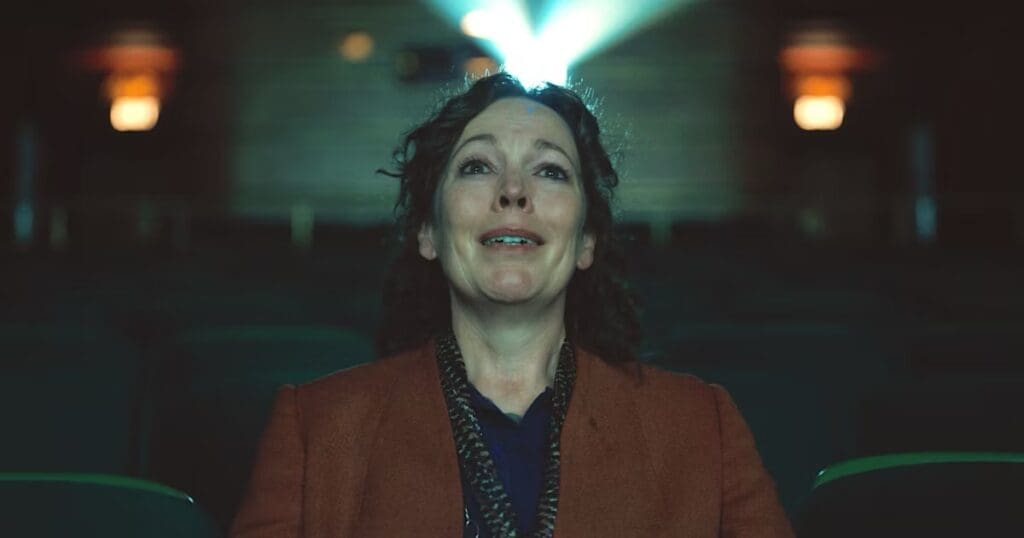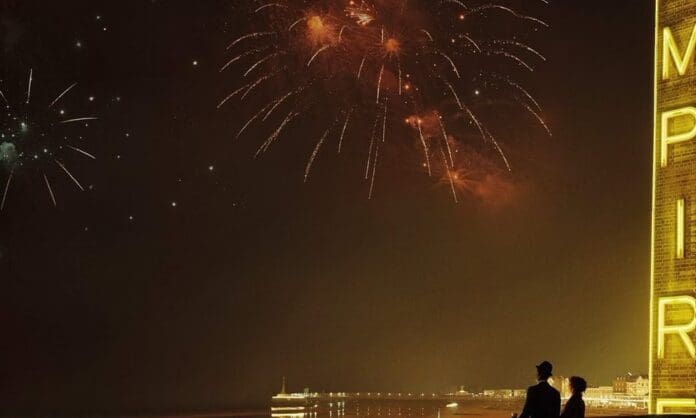Share this
Empire of Light is a Sam Mendes film that takes place during the 1980’s and follows Hillary, a middle-aged duty manager of a cinema located on the coast of England. Hillary develops a relationship with a colleague but in the process, she finds herself spiraling as her mental health steadily declines. The film stars Olivia Colman, Michael Ward, Colin Firth, and Toby Jones.
The film itself comes across as one that is dedicated to the art of cinema as well as art in general, and the impact it all has on each of us. And yet, it does so in a peculiar yet unexpected way and it’s not clear right away what the film’s intent is. Much of the focus is on the inner-workings of the cinema and the relationships between employees but especially on Hillary and the relationships she carries between herself and her boss (Colin Firth) along with her budding romance with Stephen (Michael Ward). It’s through characters like Hillary that we begin to see the difference between isolating oneself and refusing to soak in whatever is around you versus taking time to indulge in and enjoy life’s gifts. Oftentimes for many people, art is used as a form of escapism from the real world, so why not take advantage of it? And perhaps it’s in this way, that we begin to see cinema and its impact in a different perspective.
Read Also: “Babylon”: A Colorful and Obscene Love Letter To the Art of Filmmaking

But while Empire of Light certainly aims to boost art as a form of “light” that gives us all hope, I don’t feel as if it fully succeeds in doing exactly that. Instead, there is an immense focus on Hillary’s mental health and the reasoning behind it all. We are seeing the film through her eyes as it follows what feels like an out-of-touch woman’s life as it begins to spiral through her reckless behavior. We see this reflected through her lack of awareness of the films shown at the same cinema she works for but especially through the surface level understanding she has of the racial tension Stephen faces daily as a Black man, and the relationships she pursues in such a nonchalant way. I think ultimately, this is what keeps the film from touching heavily on art’s impact and instead, maintains it as more of a subtle underlying message, while trying to emphasize the challenge of working through one’s mental state.
The cinematography of the film is stunning as it widely features the theater as a central location throughout the film while also allowing the audience to explore England’s coast across many scenes. The dialogue is simple and cohesive, but also full of expression as tension rises and falls over time. Olivia Colman stands out as always in her role as she provides the appropriate range for a character like Hillary. And Michael Ward pinpoints exactly who Stephen is: a gentle man with dreams who keeps the peace but also finds himself at a crossroads between what he wants and what he needs to do.

Empire of Light is a bizarre film that I feel is fitting to watch just the one time and to reflect on it going forward. There are several stunning shots, and dramatic moments that are boosted by the performances of the cast. But unfortunately, I think the issue lies in the fact that without the cast, the film would be soulless and without meaning. Its intent feels messy and unsure of itself, having almost no faith to drive home the impact of film as it coincides with our natural need to escape the world we live in, even if for a little while. Instead, it opts to shove that underneath and gain some sort of recognition in its portrayal of mental health. Frankly, that leaves more of a bad taste in my mouth than anything.
Ultimately, I wouldn’t push anyone away from watching this film. There are definitely moments that feel cheap and surface level, and the film relies heavily on cast talent. But in its own way, Empire of Light can be beautiful and rich at times, both visually and emotionally. It all depends on your perspective.
Samosa Rating:
Empire of Light receives 3 out of 5 Samosas.
Empire of Light is now streaming on HBO Max.
Runtime: 1h 53m


